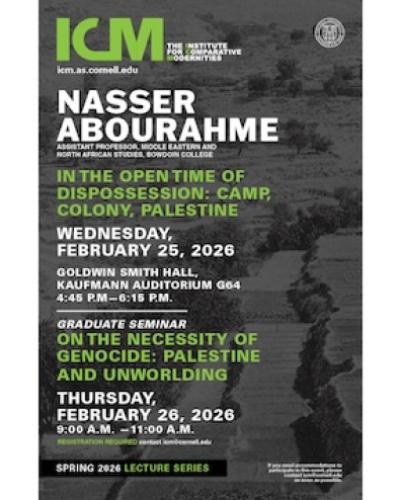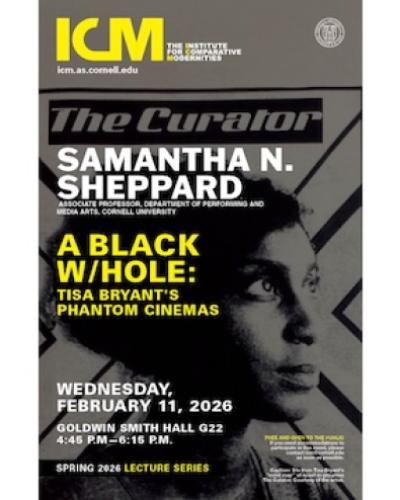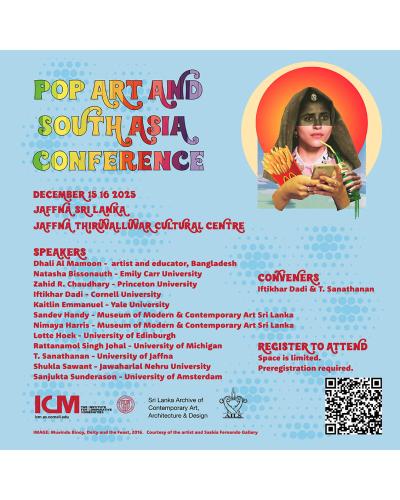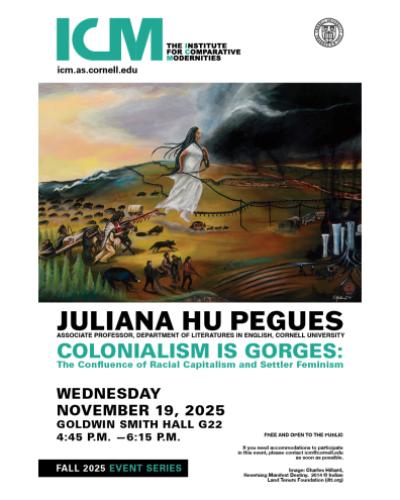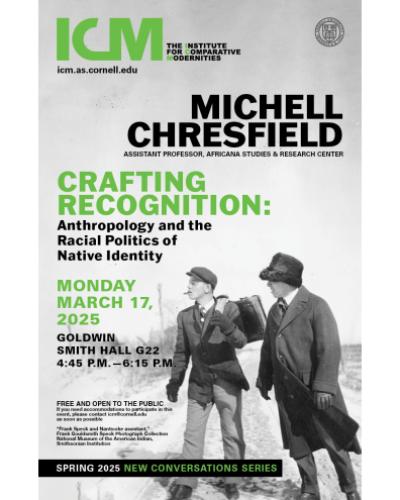ICM NEW CONVERSATIONS SERIES
MICHELL CHRESFIELD (Assistant Professor, Africana Studies & Research Center)
“Crafting Recognition: Anthropology and the Racial Politics of Native Identity”
Monday, March 17, 2025
Goldwin Smith Hall G22 | 4:45pm—6:15pm | Reception to Follow
ABSTRACT
This talk examines the work of anthropologist Frank Speck, a key figure in early 20th-century ethnography who dedicated much of his career to documenting cultural persistence amongst the descendants of the Eastern Woodland Indians. Speck not only recorded linguistic and cultural traditions, his work went beyond observation as he facilitated language revitalization efforts, assisted in the political organization of Indigenous groups, and provided a framework through which Native peoples could assert their heritage in the face of racialized scientific classifications. By exploring Speck’s ethnographic legacy and his entanglement with Native activism, this talk will interrogate the intersections of anthropology, race-making, and Indigenous sovereignty.
BIO
Michell Chresfield is Assistant Professor of African American History in the Africana Studies and Research Center at Cornell University, where her research and teaching focuses on Black and Indigenous histories, the history of science and medicine, and the history of racial formation and identity making in twentieth century America. She received her Bachelor’s degree in American Studies from the University of Notre Dame in 2008 and a Ph.D from Vanderbilt University in 2016.
Dr. Chresfield’s current book project, positioned at the intersections of African American history, Native American Studies, and the history of science asks, “What does it mean to be both Black and Native? And how does scientific knowledge mediate that lived experience?” “What Lies Between: Science and the Making of Native Identity in a Black and White World,” explores how communities of purported “red-white-black” ancestry, have worked with and against the emergent sciences of the 20th century in order to make and challenge notions of identity and belonging. Examining key episodes in the development of eugenics, blood group genetics, and modern-day DNA testing, the book traces the historical and present-day use of medical and scientific diagnostics as an arbiter of racial meaning. Although the communities at the center of Chresfield’s research wished to be recognized as Native Americans, they were more commonly dismissed as “triracial isolates,” geographically isolated maroon communities wishing to use the “Native” category as a means of escaping the stigma of blackness. This dismissal underscores the American racial orthodoxy of hypodescent, whereby one drop of Black blood is enough to render all other ancestry irrelevant. In “What Lies Between,” she argues that despite the wide purchase of the one-drop rule, Native groups and the lawmakers, scientists, and bureaucrats tasked with policing their identity functioned as coproducers in the formation of Black-Native identity and the shaping of its public meanings. Dr. Chresfield’s writings and interviews have appeared in a variety of outlets, including the Times Literary Supplement, the Los Angeles Review of Books, The Conversation, BBC Radio 4 's "The Woman’s Hour," and The Globalist,. Her research has been funded by grants from the American Philosophical Society, the Robert Penn Warren Center for the Humanities, and the British Academy. At Cornell, she teaches courses on Black body politics, Black and Native histories, the history of reproduction, as well as African American health and healing more broadly.

